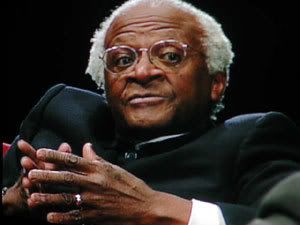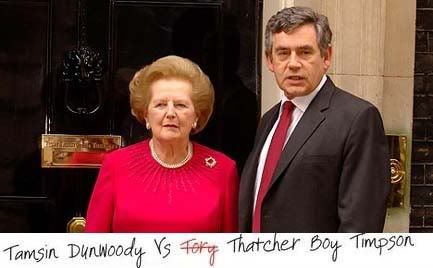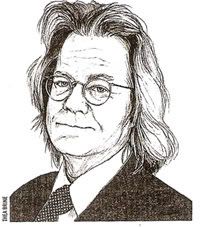
Since my brother Asinus was away on business the other day, I found myself taking his daughter, my niece Perturbata, to an Orthodontist so that braces of the "train-track"variety could be attached to her teeth.
This is something that I've spoken to both Asinus and his daughter about before. Perturbata's lower jaw contains two twisted teeth, and was given the choice of whether or not to have an orthodontic brace by her dentist.
So far, so fair. The thing is, she was given full braces on both sets of teeth, on the NHS, by an orthodontist who explained everything beforehand as if he were outlining a beauty proceedure. A calculated length of stubble poked through perfect skin - I bet he moisturises.
Perturbata ended up with what she had wanted, then we were taken into a cranny to see a DVD on how one should take care of one's braces. She wasn't allowed to take anything coloured, like Coke, jelly-beans or tomato sauce; anything hard, like gobstoppers or carrots; anything crunchy, like peanuts, crisps or toast; in fact, she had to fast from the palate of childhood. I regret, now, that I reminded her of the old saying that you should be careful what you wish for, in case you get it.
I don't know what Perturbata's treatment cost on the NHS, but another orthodontic centre advertises its prices from "£250 to £7,000". I wonder where a brace on both sets of teeth in order to correct two on the lower jaw falls. And what is the value of those two twisted teeth, which turn up in at least one person in each generation of our family? If I'm ugly, at least I'm continuing a generations-long tradition of being ugly. And being beautiful is risky - a WAG might marry me.
Perturbata and I, I have to admit, had a bit of a falling out. It took a shouting session between Professor Calculus and I to make me realise that Perturbata would remember my response, in Asinus' absence, for a long time to come. So, at Calculus' suggestion, I hugged her and told her that she was beautiful now, but would be more beautiful in a year when the brace came off.
After making the orthodontist richer with taxpayers' money, Perturbata and I went to visit a friend of ours who is hospitalised in Addenbrooke's occasionally so that she can catch MRSA. Afterwards, we went to the concourse and had chips. Perturbata gave me hers, because they were catching in her brace. Being of Scottish ancestry, she has chip-shaped chromosomes, so this was a bad sign.
Perturbata asked me, holding back tears, "How do you make good decisions?"
I replied, "You look at you bad decisions, analyse why they didn't work, and try to do better next time."
"So you've got it worked out?"
I looked at her sadly. "No."
Related posts:
Good dentistry - it's like pulling teeth
Blood, tears and celebrity dentists


 y favourite and always has been, through its various reworkings. Like George Lucas, EJ believes some projects are never finished, just left alone for a while (although, unlike Lucas' oevre, EJ's gets better every time). It's a plaintive cry for the securities of the past, within which it seems at last we are allowed backstage to see the actress remove her mask. The line "I just want to go back" brings to mind Seamus Heaney misquoting LP Hartley to call the past "another country". One might add that they do things differently there because life inexorably carries us away from a place where life was simpler and safer, even if that place never quite existed.
y favourite and always has been, through its various reworkings. Like George Lucas, EJ believes some projects are never finished, just left alone for a while (although, unlike Lucas' oevre, EJ's gets better every time). It's a plaintive cry for the securities of the past, within which it seems at last we are allowed backstage to see the actress remove her mask. The line "I just want to go back" brings to mind Seamus Heaney misquoting LP Hartley to call the past "another country". One might add that they do things differently there because life inexorably carries us away from a place where life was simpler and safer, even if that place never quite existed.
 riteria to universities such as Cambridge and Oxford, because all this produces is a way for genetically inferior people to access [gasp] education. In other words, don't teach the children of poor folk certain things.
riteria to universities such as Cambridge and Oxford, because all this produces is a way for genetically inferior people to access [gasp] education. In other words, don't teach the children of poor folk certain things.  evolutionist recently got himself into hot water in matters realting to education and intelligence - James Watson (left), who discovered DNA with Francis Crick by stealing material from
evolutionist recently got himself into hot water in matters realting to education and intelligence - James Watson (left), who discovered DNA with Francis Crick by stealing material from 

 other of five fighting hard for a job" lives in a rather expensive house set in one-and-a-half acres of land. The villa is around 175km from the constituency she is campaigning to represent. This isn't unusual in itself, but what is unusual is that Stephen Ladyman, Labour's vice-chairman, states that Tory candidate
other of five fighting hard for a job" lives in a rather expensive house set in one-and-a-half acres of land. The villa is around 175km from the constituency she is campaigning to represent. This isn't unusual in itself, but what is unusual is that Stephen Ladyman, Labour's vice-chairman, states that Tory candidate 








 on - hailed by the Daily Mail as a
on - hailed by the Daily Mail as a 

 hey distract drivers and cause accidents. Personally, if I saw a cluster of roadside shrines, it would occur to me that since a few people had died in that location, I should reduce my speed. Taking the shrines away, to my mind, is removing intelligence that drivers should be extra careful on a certain section or a certain bend.
hey distract drivers and cause accidents. Personally, if I saw a cluster of roadside shrines, it would occur to me that since a few people had died in that location, I should reduce my speed. Taking the shrines away, to my mind, is removing intelligence that drivers should be extra careful on a certain section or a certain bend.









